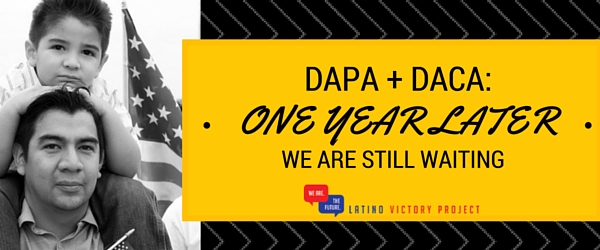
Next week, families and friends across the country will gather for a special celebration of thanks giving. Beyond the turkey or tamales or lechón and whatever succulent trimmings comprise your feast, next Thursday night will truly be about the warmth of having your mother’s embrace greet you at the door or laughing at an inside joke with your son or daughter. For millions of people living in the United States, however, Thanksgiving will come with a looming fear that came close to eradication one year ago today: the fear of losing their mother or father to a deportation order.
One year ago today, President Obama announced an Executive Action order that expanded DACA and created DAPA. The latter would offer deferred action for unauthorized immigrant parents of millions of U.S. citizens and lawful permanent residents. However, just two months before the expanded DACA and DAPA application process began, a federal court in Texas—a state known for its conservative everything—issued a preliminary injunction thwarting the implementation. On November 9, 2015, the U.S. Court of Appeals upheld the injunction. Despite the benefits of implementing the Executive Action—wages would dramatically raise for all Americans by $124 billion over a decade and the U.S. GDP would increase by $230 billion—many on the conservative aisle still want to eliminate it.
One year ago today, millions of Americans were elated to give thanks because they would no longer be afraid of seeing their mother or father handcuffed and taken by black-clad ICE agents, as they surely have seen in more than a few testimonies shown on segments on weekend edition news shows. What was supposed to be an act of humanity to keep families together turned into a political theatre in the hands of conservatives. If these right-wing conservatives’ knee-jerk reaction to Latino issues stays its course, like in any other issue pertaining to the Latino community and other communities of color, they will end up losing a significant portion of Latino support where it will hurt them the most: their candidates’ votes.
Yesterday, the Center for American Progress released a report that indicates that the U.S. citizens who are related to people who are affected by DAPA will play a key role in the coming election years. The report found that in 2016, there will be 1.5 million DAPA-affected voters in the country. What does this mean? 1.5 million U.S. citizens related to residents that stand to benefit from DAPA implementation are eligible to head for the polls in 2016. This number is projected to increase as the citizens turn of voting age: 2.25 million in 2020 and 6.3 million in 2032. CAP notes that this electorate will monitor candidates’ stance on DAPA and immigration and will have a considerable impact on the election. If a candidate does not support issues that are important to Latinos, we do not vote for them.
Throughout the 2016 presidential campaign trail, several candidates have lashed out against DACA and DAPA, and some even showcase mass deportation as a key component in their platforms. Candidates like Marco Rubio, Ted Cruz and Donald Trump are at the top of the list. That they would rather see American families separated and spread xenophobic rhetoric than have a meaningful discussion on immigration is shameful. They have set themselves up to lose the majority of the Latino vote.
Thanksgiving, one of the most cherished holidays in the United States, commemorates the kindness and hospitality bestowed upon an immigrant group from Europe by the Native Americans who helped them survive in a foreign land. It is unreal and unjust that next week, when many will rejoice in this holiday, others will still have the unnerving fear of having their loved ones sent away, devoid of the very hospitality that launched this thanks giving celebration.